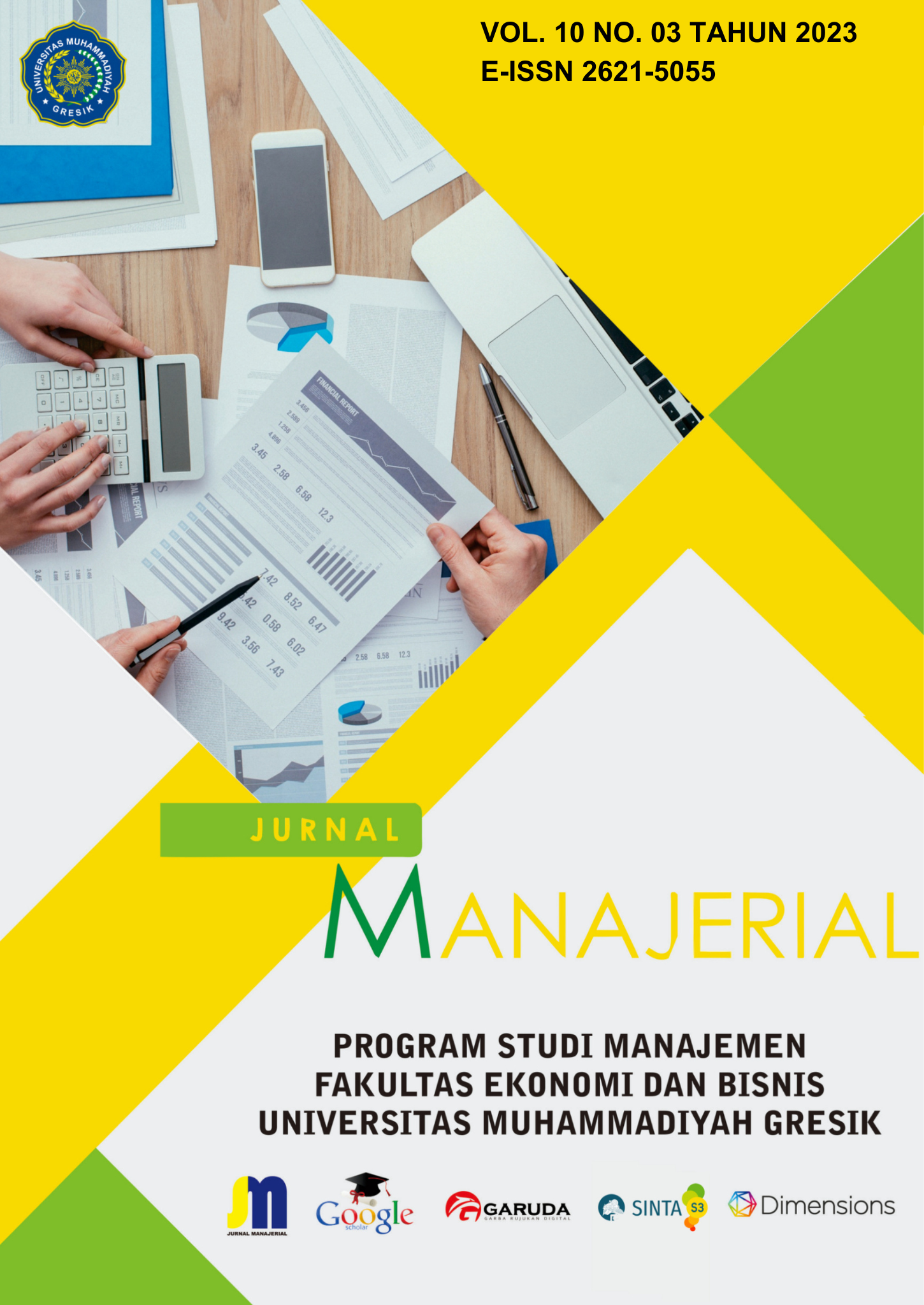The The Mediating Role of Competence on the Effect of Organizational Culture and Readiness To Change on Organizational Entrepreneurship
DOI:
https://doi.org/10.30587/jurnalmanajerial.v10i03.6244Keywords:
Organizational, Culture, Readiness, To Change, Entrepreneurship, CompetenceAbstract
Background – An increasingly dynamic environment keeps the organization moving. To stay relevant, it is necessary to support readiness for change, especially related to the Human Resources (HR) competence. The sustainability of an organization is influenced by independence through entrepreneurial activities to contribute to independent funds
Research purposes – This research aims to determine how readiness to change runs in organizational culture for human resources by improving organizational entrepreneurship competencies
Design/ Methodology/ Approach – This study applied quantitative research with survey techniques and SEM AMOS analysis tools. Statements were distributed using a Likert scale of 1-5. Based on the results of the validity and reliability test, it was declared valid and reliable. Before testing the hypothesis with a structural model, a model suitability test (Fit) based on data processing was carried out using the SEM-AMOS analysis tool.
Results and Discussion – 1) Organizational culture has a significant effect on Organizational Entrepreneurship. 2) Organizational culture has a significant effect on competence. 3) Organizational culture positively affects organizational entrepreneurship with Competence as a mediator variable. 4) Readiness to change does not have a positive effect on organizational entrepreneurship. 5) Readiness to change in HR has a positive effect on competence. 6) Readiness to change has a positive effect on organizational entrepreneurship with competence as a mediator variable. 7) Competence has a positive effect on organizational entrepreneurship.
Conclusion – The influence of readiness for change in human resources on organizational entrepreneurship with competence as a mediator variable resulted in significant and positive results of the influence of independent variables on the dependent variable with human resource competence as a mediator variable.
Research implications – This research provides knowledge to readers/business actors/stakeholders that the readiness to change human resources towards organizational entrepreneurship with competency as the moderator variable has a significant influence.
Research limitations – This research discusses the mediating role of competence on the effect of organizations and readiness to change on organizational entrepreneurship
References
Acar, A. Z., & Acar, P. (2012). The Effects of Organizational Culture and Innovativeness on Business Performance in Healthcare Industry. Procedia - Social and Behavioral Sciences, 58, 683–692. https://doi.org/10.1016/j.sbspro.2012.09.1046
Aruman, A. E., Sumardjo, S., Panjaitan, N. K., & Sadono, D. (2017). Model Komunikasi untuk Membangun Kesiapan Perubahan. Jurnal Komunikasi Pembangunan, 15(1), 43–55. https://doi.org/10.46937/15201722768
Andriani, H., Dahesihsari, R., Psikologi, M., Unika, P., & Jaya, A. (2017). Hubungan Antara Keterlibatan Karyawan Dalam Proses Perubahan Dengan Kesuapan Mereka Menghadapi Perubahan:Studi Pada Divisi Sales PT. ABC. Jurnal Ilmiah Psikologi MANASA, 6(1), 1–14.
Aktsar H. T & Gugup Kismon (2019). Organizational Culture types and Individual Readiness for Change: Evidence from Indonesia. Jurnal Bisnis Internasional Diponegoro no.2 h.86-95.
Antoncic, B., & Hisrich, RD (2001). Intrapreneurship: Membangun penyempurnaan dan lintas budaya validasi. Jurnal usaha, 16 ( 5), 495-527.
Audretsch, D. (2012). Entrepreneurship research. Management Decision, 50(5), 755–
764. https://doi.org/10.1108/00251741211227384.
Ahmad E.S.N & Dwi S. (2017). Model Komunikasi ( Kompetensi) untuk membangun kesiapan Perubahan. Jurnal Komunikasi Pembangunan Februari 2017, vol.15 no.2 ISSN-2442-4102.
Azmy, A. (2015). Pengembangan Kompetensi Sumber Daya Manusia untuk Mencapai Career Ready Professional di Universitas Tanri Abeng. Binus Business Review, 6(2), 220. https://doi.org/10.21512/bbr.v6i2.971
Behram, N. K., & Özdemirci, A. (2014). The Empirical Link between Environmental Conditions , Organizational Culture , Corporate Entrepreneurship and Performance : The Mediating Role of Corporate Entrepreneurship. International Journal of Business and Social Science, 5(2), 264–277.
Biryukov, V. V., Romanenko, E. V., Khairova, S. M., & Khairov, B. G. (2015). Cyclic-temporal competitive advantages of the national economy and entrepreneurship development. Mediterranean Journal of Social Sciences, 6(4), 64–71. https://doi.org/10.5901/mjss.2015.v6n4s4p64.
Barman, Arup & Karan (2020). Apakah B-Schools Care Spencer& Spencer’s Workplace Competence Kerangka di Abad 21? Memvalidasi ulang melalui Keandalan. Jurnal Internasional Sains dan Teknologi Lanjut Vol.29 no.11.
Bushuyev, S., Murzabekova, A., Murzabekova, S., & Khusainova, M. (2017). Develop breakthrough competence of project managers based on entrepreneurship energy. Proceedings of the 12th International Scientific and Technical Conference on Computer Sciences and Information Technologies, CSIT 2017, 2, 11–16. https://doi.org/10.1109/STC-CSIT.2017.8099420
Baron, R. A., & Henry, R. A. (2010). Entrepreneurship: The genesis of organizations. APA Handbook of Industrial and Organizational Psychology, Vol 1: Building and Developing the Organization., 1, 241–273. https://doi.org/10.1037/12169-008
Burglemann, RA (1983). “Desain untuk Kewirausahaan Perusahaan”. California Management Review, 26 (1), 154-166.
Callista, N. (2016). Pengaruh Kompetesnsi Sumber Daya Mnausia Terhadap Kinerja Karyawan Pada PT . Tresnamuda Sejati Cabang Surabaya.
Akuntansi, 4(2), 45–50.
Cohen. P & Lena Simone, (2020). Turning Change Resistance into Readiness: How Change cAgents Communication Shapes recipient Reactions. European Management Journal.
Chirani, E., & Hasanzadeh, R. (2013). The Aspects of Organizational Entrepreneurship in Competition Environment. Kuwait Chapter of Arabian Journal of Business and Management Review, 2(11), 65–70. https://doi.org/10.12816/0001259
Clarke, L. (2002), schimbării Managementul. Ghid practic privindproducerea, menţinerea şi controlul schimbării INTR-o Firma sau organizaţie,Editura Teora, Bucureşti
Cohen, P. J., Glaser, B. A., Calhoun, G. B., Bradshaw, C. P., & Petrocelli, J. V. (2005). Examining readiness for change: A preliminary evaluation of the University of Rhode Island Change Assessment with incarcerated adolescents. Measurement and Evaluation in Counseling and Development, 38(1), 45–62. https://doi.org/10.1080/07481756.2005.11909768
Covin, JG & Slevin, DP (1991). “Sebuah model konseptual kewirausahaan sebagai perilaku perusahaan”. Kewirausahaan: Teori & Praktek, 16 (1), 7-25.
Covin, JG dan Miles, MP (1999). “Kewirausahaan Perusahaan dan mengejar keunggulan kompetitif”. Kewirausahaan Teori dan Praktek, 23 (3), 47-64.
Dhamayantie, E. (2017). Penguatan Karakteristik Dan Kompetensi Kewirausahaan Untuk Meningkatkan Kinerja Umkm. Jurnal Manajemen, Strategi Bisnis Dan Kewirausahaan,11(1),8091.https://doi.org/https://doi.org/10.24843/MATRI K:JMBK.2017.v11.i01.p07
Dirgantoro, C. (2001). Manajemen Stratejik : Konsep, Kasus, dan Implementasi.
Jakarta : PT. GramediaWidiasarana Indonesia.
Daniel H. AH & Field H, (2007). Toward a Comprehensive Definition of Readiness for Change: A Review of Research and Instrumentation. Research in Organizational Change and Development Vol.16 pp. 289-336 ISSN.0897- 3016.
Dyah. PW, (2019). The Effect Of Nasyiatul Aisyiyah Business On The Development Of Its Members Self-Potential: Case Study In Central Java, Humanities & Social Sciences
Drucker,P (2010), Innovation and Entrepreneurship ,2Rev Ed edition. Butterworth- Heineman
Dyah Pikanthi Diwanti. (2018). BUANA ( Badan Usaha dan Amal Nasyiatul Aisyiyah ) sebagai Model Best Practice Kewirausahaan Organisasi. 45–59.
Brettel, Malte Engelen, AndreasFlatten, Tessa Christina Thalmann, Julia (2014). Pengaruh Budaya Organisasi terhadap Orientasi Kewirausahaan: Perbandingan antara Jerman dan Thailand
Chirani, Ebrahim & Hasanzadeh, (2013). The Aspects of Organizational Entrepreneurship in Competition Environment. Kuwait Chapter of Arabian Journal of Business and Management Review Vol.2 no.11
Fox, JM (2005). Kewirausahaan Organisasi dan hubungan kinerja organisasi di Indonesiaekstensi universitas. Disertasi doktoral, universitas negeri Ohio.
Fatema N.K & Ahmad (2015),
Enhancing_competitiveness_of_India_Inc_Creating_linkages_between_orga
nizational_and_national_com. Jurnal Internasional Ekonomi dan Keuangan Vol.7 no.2
Guamaradewi, GN dan Mangundjaya L (2018). Dampak Kesiapan Individu dan Kesiapan Organisasi untuk Berubah bagi Komitmen Afektif untuk Berubah. Jurnal Manajemen Aset Infrastruktur & Fasilitas – Vol. 2, No.2 57-58.
Gnyawali, D,. and Fogel, D. (1994). Environments for Entrepreneurship Development: Key Dimensionsand Research Implications. Entrepreneurship, Theory, and Practice18 (4): 43
Ghurobi. R.M, (2012). Manajemen Perubahan Organisasi: Proses Perubahan dan Faktor Penentu Keberhasilan. aunilo: libraries of asean university network
Haffar, M., Al-Karaghouli, W., & Ghoneim, A. (2014). An empirical investigation of the influence of organizational culture on individual readiness for change in Syrian manufacturing organizations. Journal of Organizational Change Management, 27(1), 5–22. https://doi.org/10.1108/JOCM-04-2012-0046
Handfield, R., Petersen, K., Cousins, P., & Lawson, B. (2009). An organizational entrepreneurship model of supply management integration and performance outcomes. International Journal of Operations & Production Management, 29(2), 100–126. https://doi.org/10.1108/01443570910932011
Hertanto E (2017). Perbedaan Skala Likert Lima Skala dengan Modifikasi Skala Likert Empat Skala. Metode Penelitian
Hisrich, R.D. and Peters, M.P. (1992). Entrepreneurship: Starting, Developing and Managing NewEnterprise Second Edition, Homewood, Illinois: Irwin Publishing.
Hisrich Robert D., peters Michael P, (2002) '' Kewirausahaan '', Edisi Kelima
.India.:Mcgraw- Hill.
Henionen J (1999) Towards Customer Orientation and Comprtitiveness. The Potential of Intrapreneurship in the change Process of a Municipal Service Unit. Publications of the Turku School of Economics and Business Administration Series A-5:1999. Henionen J.
Hjorth, D. dan Steyaert, C. 2003 Kewirausahaan luar (baru) ekonomi: kawanan kreatif dan patogenesiszona logis, di Steyaert, C dan Hjorth, D. (eds), Gerakan baru di Kewirausahaan ( Cheltenham: Edward Elgar) pp 286-303. Hornsby, JS; Kuratko, D. & Zahra, SA (2002). “Managers` Tengah persepsi lingkungan internal untuk kewirausahaan perusahaan: menilai skala
pengukuran”. Bisnis Mengawali, 17 (2), 253-273
Hutami, Eliana Eka. 2017. Rekam Jejak Perjuangan Nasyiatul Aisyiyah Kabupaten Kendal-Jawa Tengah: Artikel
Iman, I., dan Siswandi.( 2009). Aplikasi Manajemen Perusahaan. Jakarta : Mitra Wacana Media.
Ismail, V. Y. (2014). The Comparison of Entrepreneurial Competency in Woman Micro-, Small-, and Medium-scale Entrepreneurs. Procedia - Social and Behavioral Sciences, 115(Iicies 2013), 175–187. https://doi.org/10.1016/j.sbspro.2014.02.426
Jr, J. F. H., Black, W. C., Babin, B. J., Anderson, R. E., Black, W. C., & Anderson,
R. E. (2018). Multivariate Data Analysis. https://doi.org/10.1002/9781119409137.ch4
Jahanshahi, AA, Pitamber, BK, & Nawaser, K. (2010). Masalah dan Tantangan untuk Perempuan Pengusaha diAdegan global dengan Referensi Khusus untuk India. Australia Jurnal Dasar dan Terapan Ilmu, 4 ( 90), 4347-4356.
Jahanshahi, AA, Nawaser, K., Paghaleh, MJ, & Khaksar, SMS (2011a). Peran kebijakan pemerintahdan pertumbuhan kewirausahaan di, usaha kecil & menengah mikro: Sebuah gambaran.Australia Journal of Basic & Terapan, 5(6).
Jennings, DF (1994). Berbagai perspektif kewirausahaan, Ohio, South Western Publishing. Jennings, DF & Lumpkin, JR (1989). “Secara fungsional pemodelan perusahaan kewirausahaan: analisis integratif empiris”. Jurnal Manajemen, 15 (3), 485-511.
Jones, C dan Matlay, H. 2011. “Memahami heterogenitas pendidikn kewirausahaan: melampaui Gartner“ Pendidikan + Pelatihan, 53 ( 8/9), pp.692-703.
Jones, RA, Jimmieson, NL dan Griffiths, A. (2005), "Dampak Budaya Organisasi dan Pembentukan Kembali Kemampuan terhadap Keberhasilan Implementasi Perubahan: Peran Mediasi Kesiapan Kesiapan untuk Perubahan", Jurnal Studi Manajemen, Vol. 42 No. 2, pp.361-386
Kanter, RM (1985). “Pengadaan inovasi dan pengembangan usaha di perusahaan yang didirikan”. Jurnal Bisnis Mengawali, 1 (1), 47-61.
Hanifati. K, (2017). The influence of Entrepreneurship Knowledge, Social Competence and Business Environment to Business Growth at Restaurant in Tembalang District, Semarang, Jurnal ilmu administrasi bisnis
Kuratko, DF, Montagno, RV dan Hornsby, JS (1990), “Mengembangkan kewirausahaaninstrumen penilaian untuk lingkungan kewirausahaan perusahaan yang efektif”, Strategis Manajemen Journal, Vol.11, hlm. 49-58.
Krueger N.F (2018). Sustainable Entrepreneurship: Broading The Definition of Opportunity. Department of Management Boise State University
Kabiru, M & Umair Hamed, (2016). business performance The moderating role of organizational culture. Emerald Publishing Limited 2399-1747.
Lumpkin GT, Dess G.Georgy. 2001, Linki dua dimensi orientasi kewirausahaan terhadap kinerjaperusahaan: peran moderasi lingkungan dan kehidupan industri cycle.Jornal dari bertualang bisnis,429-451
Lyle M. Spencer, J., & Spencer, S. M. (1993). Competence at Work: Models for Superior Performance. Japan Productivity Center. John Wiley & Sons, Inc., 456.
M R, V., & Babu.N, D. (2019). Impact of Personal Traits and Professional Competencies on Entrepreneurial Competencies of Women Entrepreneurs. International Journal of Innovative Technology and Exploring Engineering, 8, 521–527.
Malhi SR, (2013). Creating and Sustaining: A Quality Culture, Journal of defense management.
Madmoli, Z. (2016). Investigating the Relation between Human Resource Management and Organizational Entrepreneurship: the Mediating Role of Knowledge Sharing by Middle Managers. International Journal of Humanities and Cultural Studies, 1(1), 2739–2751.
Maria L & Fachmi T, (2021). Pengaruh Efikasi diri terhadap kesiapan untuk berubah dan Kinerja. Forum ilmiah , Vol.18 no.2
Mangundjaya, G. G. dan. (2018). Dampak Kesiapan Individu dan Kesiapan Organisasi untuk Berubah bagi Komitmen Afektif untuk Berubah. Jurnal Manajemen Aset Infrastruktur & Fasilitas, 2(2), 57–58.
Maria, V., Nassif, J., Andreassi, T., Tonelli, M. J., Tereza, M., & Fleury, L. (2012). Women entrepreneurs: Discussion about their competencies. African Journal
of Business Management, 6(26), 7694–7704. https://doi.org/10.5897/AJBM11.1347
Meria, L., & Tamzil, F. (2021). Pengaruh Efikasi Diri Terhadap Kesiapan Untuk Berubah Dan Kinerja Karyawan. Pengaruh Efikasi Diri Terhadap Kesiapan Untuk Berubah Dan Kinerja Karyawan Forum Ilmiah, 18, 279.
Mohelska, H., & Sokolova, M. (2018). Management approaches for industry 4.0 – The organizational culture perspective. Technological and Economic Development of Economy, 24(6), 2225–2240.
Miller, D. (1983), “The berkorelasi kewirausahaan dalam tiga Moghaddasi AR (2009) Feasibility of implementing organizational entrepreneurship in industrial manufacturing company S·hatb. Islamic Azad University, Mashhad Branch. Management Journal 5 (16):1-17.
Maria T.L.F (2009). Organizational Culture and the Renewal of Competences.
Brazilian Administration Review
Moghaddasi AR (2009) Feasibility of implementing organizational entrepreneurship in industrial manufacturing company S·hatb. Islamic Azad University, Mashhad Branch. Management Journal 5 (16):1-17.
Moghimi M (2004) Entrepreneurship in Iranian Non Governmental Organization. Dissertation Presented in Partial Fulfillment of the Requirements for the degree Doctor of Philosophy in Management in Tehran University, Iran.
Müge Leyla YILDIZ, PhD (2014), The Effects of Organizational Culture on Corporate Entrepreneurship, International Journal of Business and Social Science Vol. 5, No. 5(1); April 2014
Naguib, R., & Jamali, D. (2015). Female entrepreneurship in the UAE: a multi- level integrative lens. Gender in Management: An International Journal, 30(2), 135–161. https://doi.org/10.1108/GM-12-2013-0142
Nieva, F. O. (2015). Social women entrepreneurship in the Kingdom of Saudi Arabia. Journal of Global Entrepreneurship Research, 5(1). https://doi.org/10.1186/s40497-015-0028-5
Noersasongko, E. (2014). Analisis Pengaruh Karakteristik Individu, Kewirausahaan Dan Gaya Kepemimpinan Terhadap Kemampuan Usaha Serta Keberhasilan Usaha Pada Usaha Kecil Abtik Di Jawa Tengah. http://eprints.dinus.ac.id/id/eprint/14003
Nurul Asfiah, Titiek Ambarwati, R. S. A. (2021). Islamic Social Entrepreneurship Model of Business Women in Pandemic Era in East Java. https://scholar.google.co.id/citations?view_op=view_citation&hl=id&user=O uP6I2QAAAAJ&citation_for_view=OuP6I2QAAAAJ:Zph67rFs4hoC
Nurul Fathia Mahessa, F. N. F. (2016). Fakultas Psikologi, Universitas Diponegoro, Jl. Prof. Soedarto, SH, Kampus Undip Tembalang, Semarang, Indonesia 50275. Jurnal Empati, 5(24), 113–116.
Organisasi Buruh Internasional (2014) .Women ' pengembangan s kewirausahaan. http://www.ilo.org/wcmsp5/groups/publik/ - ed_emp / - emp_ent / - ifp_seed
/ dokumen / publikasi / wcms_175471.pdf. Diakses 1 April 2015.
Penjajar, S., Ekonomi, F., Katholik, U., & Mandala, W. (2018). 16362-Article Text- 16360-1-10-20080902. 162–179.
Parker. SC (2010). intrapreneurship atau kewirausahaan. Jurnal dari BusinessVenturing.121-2.21. Pinchot, G. (1985), Entrapreneuring, Harper & Row, New York, NY. Pinchot, G. (1987),“Inovasi melalui intrapreneuring”, Manajemen penelitian, Vol. 13 No 2
Peraturan Pemerintah (PP) No. 101 Tahun 2000 tentang Pendidikan Dan Pelatihan
Jabatan Pegawai Negeri Sipil, Pub. L. No. 101 (2000).
https://peraturan.bpk.go.id/Home/Details/53673/pp-no-101-tahun- 2000#:~:text=PP No. 101 Tahun 2000,Negeri Sipil %5BJDIH BPK RI%5D
Prayitno, I. (2006). Budaya Organisasi. Jakarta: Psychology Press.
Raadabadi, M., Fayaz-Bakhsh, A., Nazari, A., Mousavi, S. M., & Fayaz-Bakhsh,
M. (2014). Organizational entrepreneurship and administrators of hospitals: case study of Iran. Global Journal of Health Science, 6(3), 249–255. https://doi.org/10.5539/gjhs.v6n3p249
Panagio P. & Trivellas, (2016). The impact of strong and balanced organizational cultures on firm performance assessing moderated effects. International journal of Quality and service Sciences Vol.10 no.1
Ramirez, AR, R. Orejuela, dan GM Vargas. (2013). Perspektif baru untukKewirausahaan manajerial. Kewirausahaan nternational dan Manajemen Journal
Ratna Winandi, Bayu Sumantri, A. F. (2011). Faktor-Faktor yang Berpengaruh terhadap Kinerja Usaha Wirausaha Wanita: Suatu Studi pada Industri Pangan Rumahan di Bogor. Jurnal Manajemen Teknologi, 3(12), 252–277. journal.sbm.itb.ac.id
RD, Camp, SM dan Sexton, DL (2001), “pengenalan editor tamu ke edisi khusus - kewirausahaan strategis: strategi kewirausahaan untuk penciptaan kekayaan”, Strategis Manajemen Journal, Vol. 22 Nos 6/7, pp. 479-91
Robbins, S. P., & Coulter, M. (2012). Management. In Paper Knowledge .
Toward a Media History of Documents. Pearson Education, Inc.
Robinson, S. (2001), “Pemeriksaan motif kewirausahaan dan pengaruh mereka di jalanperempuan pedesaan pemilik usaha kecil mengelola karyawan mereka”, Journal of DevelopmentalKewirausahaan, Vol. 6 No. 2, pp. 151-167. Schumpeter, JA (1934), Teori Pembangunan Ekonomi, HarvardUniversity Press,Cambridge, MA.
Rosiadi, A., Setiawan, M., & Moko, W. (2018). Praktek Manajemen Sumber Daya Manusia Berbasis Kompetensi pada Organisasi Sektor Publik. Jurnal Manajemen Dan Kewirausahaan, 6(2), 156–169. https://doi.org/10.26905/jmdk.v6i2.2208
Setiawan, H. (2006). Pengaruh Orientasi Pasar, Budaya Organisasi Dan Orientasi Kewirausahaan Terhadap Kinerja Usaha (Studi pada Usaha Kecil Pengolahan di Kota Palembang) Heri Setiawan 1.
Agha, Sabah Pembantu, Profesor. (2021). Pengaruh Sistem Kerja Kinerja Tinggi, Kewirausahaan dan Budaya Organisasi terhadap Penampilan organisasi
Sathe, V. (2003). Kewirausahaan Perusahaan: Manajer Top dan Penciptaan Bisnis Baru.
Seong, YJ, (2011). The Effects of High Performance Work Systems, Entrepreneurship and Organizational Culture on Organizational Performance. Seoul Journal of Business Volume 17, Number 1 Cambridge University Press. Cambridge.
Sarwoko, E., Hadiwidjojo, D., Fakultas, B., & Brawijaya, U. (2013). Karakteristik kewirausahaan dan Kompetensi sebagai Penentu Kinerja Usaha di UKM.
7(3), 31–38.
Susanto & Alfonsus, (2008). Organizational Readiness for Change: A Case Study on Change Readiness in a Manufacturing Company in Indonesia. International Journal of Management Perspective ISSN: 1307-1629 Tahun 2008 Vol 2 no.1.
Savira, H. (2017). Pentingnya Kemampuan Wirausaha bagi Generasi Muda.
Kompasiana.https://www.kompasiana.com/hanumsavira/59c2ffcd298f3954e f6d2244/pentingnya-kemampuan-wirausaha-bagi-generasi-muda
Schein, E. H. (2004). Organizational Culture and Leadership Third Edition. In
Jossey-Bass (3rd ed.). Jossey-Bass.https://doi.org/10.1016/j.sbspro.2011.12.156
Schneider, K. (2017). Entrepreneurial Competencies of Women Entrepreneurs of Micro and Small Enterprises. Science Journal of Education, 5(6), 252. https://doi.org/10.11648/j.sjedu.20170506.14
Shane, S. (2003), Sebuah teori umum kewirausahaan, The Individu-Peluang Nexus, Cheltenham: Edward Elgar
Shane, S. & Venkataraman, S. (2000), Janji kewirausahaan sebagai bidang penelitian, Academy of Management Review, Vol. 25, hlm.217-226.
Shirmmorad Marzban, Seyed Mohammad Moghini, M. R. (2010). The Effective factors in Organizational Entrepreneurship Climate.
Sihombing, E., & Ekyawan, F. (2013). Pengaruh Kompetensi Wirausaha dan Lingkungan Bisnis terhadap Kesuksesan Wirausaha pada Usaha Kecil (Studi Kasus pada Bisnis Ritel di wilayah Jakarta Timur). Departmen Manajemen, FE UI, 19.
Siti Nisrin Mohammed Anis, Amran Mohammed Rasli, N. H. H. (2016). Through the Looking Glass: Enhancing Public University Librarians‟ Entrepreneurial Competencies in Facing the Impact of Globalization. International Review of Management and Marketing, 6, 70–79. www.econjournals.com
Stephen P. Robbins, M. C. (2012). Management (11th ed.). Pearson Education. Stevenson, H. dan Jarillo, J. (1990), “Sebuah paradigma kewirausahaan:
kewirausahaanpengelolaan", Strategis Manajemen Journal, Vol. 11, hlm.
Sullivan, D. M., & Meek, W. R. (2012). Gender and entrepreneurship: a review and process model. Journal of Managerial Psychology, 27(5), 428–458. https://doi.org/10.1108/02683941211235373
Sumual, T. E. (2015). Pengaruh Kompetensi Kepemimpinan, Budaya Organisasi terhadap Kinerja Pegawai di Universitas Negeri Manado. MIMBAR, Jurnal Sosial Dan Pembangunan, 31(1), 71.
https://doi.org/10.29313/mimbar.v31i1.1296
Susyanto, H. (2019). Pengaruh Kepemimpinan, Keterlibatan Karyawan Dan Kepuasan Kerja Terhadap Kesiapan Untuk Berubah Dalam Menghadapi Perubahan Organisasi. Jurnal Ekonomi, Bisnis, Dan Akuntansi, 21(1). https://doi.org/10.32424/jeba.v21i1.1287.
Schreide, Kaathe, (2017). Entrepreneurial Competencies of Women Entrepreneurs of Micro and Small Enterprises
Syafarudin, A., & Sudiarditha, I. K. R. (2018). Analisis Kompetensi Strategi Sumber Daya Manusia Pada Pelaku Usaha Industri Kreatif. Ecodemica, 2(2), 263–274.
https://ejournal.bsi.ac.id/ejurnal/index.php/ecodemica/article/view/4459
Tangan, R., Ragatz, G., Petersen, K. dan Monczka, R. (1999), “Melibatkan
pemasok dalam baru pengembangan produk", California Management Review, Vol. 42 No 1, pp. 59-82
Ulrich, D., Brockbank, W., Johnson, D., & Younger, J. (2007). Human resource competencies: Responding to increased expectations. Employment Relations Today, 34(3), 1–12. https://doi.org/10.1002/ert.20159
Umrani, W. A., Kura, K. M., & Ahmed, U. (2018). Corporate entrepreneurship and business performance The moderating role of organizational culture in selected banks in Pakistan. PSU Research Review, 2(1), 59–80. https://doi.org/10.1108/prr-12-2016-0011
Venkataraman, S. (2001), “Kewirausahaan sebagai lapangan penelitian: respon terhadapZahra dan Dess Singh, dan Erickson”, Academy of Management Review, Vol. 26, hlm. 13- 17.(2010), “The psikologi sosial dari perilaku kewirausahaan”, di Acs, ZJ danAudretsch, DB (Eds), Handbook of Entrepreneurship Penelitian, Springer, New York, NY, pp. 359-86.
Venkataraman, S. (1997), “The domain khas dari penelitian kewirausahaan”, di Katz, J.
Vakola, Maria (2012). What’s in there for mne? Individual Readiness to Change and the perceived impact of Organizational Change. Leadership and Organization Development Journal Vol.35 no.3 (Ed.), Kemajuan dalam Kewirausahaan, Emergence Firm dan Pertumbuhan, Vol. 3, JAI Press, Greenwich, CT, pp. 119-38.
Whittington, R., Pettigrew, A., & Thomas, H. (2002). Kesimpulan: Melakukan lebih dalam strategi penelitian.Dalam A. Pettigrew, H. Thomas, & R. Whittington (Eds.), Handbook strategi dan manajemen (pp. 475-488). ThousandOaks, CA: Sage
Umrani, A, W (2018). Kajian tentang kewirausahaan. PSU Research Review Women Review. (2012). Perempuan Kuasai Industri Rumahan. Women Review –
Edisi 01, Tahun 01,Juli 2012
Yildiz, L. (2014). The Effects of Organizational Culture on Risk Management.
International Journal of Business and Social Science, 5(1), 35–44.
Zahra, SA, Irlandia, RD, Gutierrez, I. & Hitt, MA (2000), Privatisasi dan transformasi kewirausahaan: muncul isu dan agenda penelitianmendatang, Academy of Management Review, Vol. 23, hlm. 509-524.
Zizile, T., & Tendai, C. (2018). The importance of entrepreneurial competencies on the performance of women entrepreneurs in South Africa. Journal of Applied Business Research, 34(2), 223–236. https://doi.org/10.19030/jabr.v34i2.10122
Zhao, H., Teng, H., & Wu, Q. (2018). The effect of corporate culture on firm performance: Evidence from China. China Journal of Accounting Research, 11(1), 1–19. https://doi.org/10.1016/j.cjar.2018.01.003






























 P-ISSN: 2354-8592 __ E-ISSN: 2621-5055
P-ISSN: 2354-8592 __ E-ISSN: 2621-5055 
